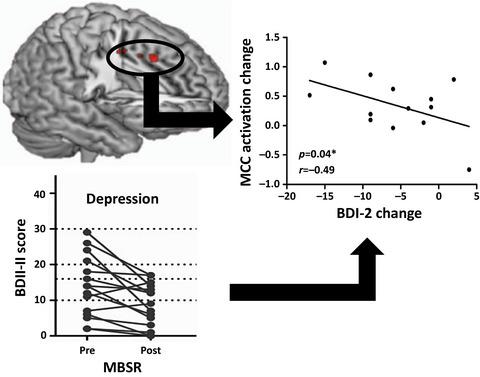当前位置:
X-MOL 学术
›
J. Neurosci. Res.
›
论文详情
Our official English website, www.x-mol.net, welcomes your
feedback! (Note: you will need to create a separate account there.)
The neural correlates of mindfulness-induced depression reduction in adults with autism spectrum disorder: A pilot study.
Journal of Neuroscience Research ( IF 2.9 ) Pub Date : 2020-02-23 , DOI: 10.1002/jnr.24600 Broc A Pagni 1 , Melissa J M Walsh 1 , Emily Foldes 1 , Ann Sebren 1 , Maria V Dixon 1 , Nicolas Guerithault 1 , B Blair Braden 1
Journal of Neuroscience Research ( IF 2.9 ) Pub Date : 2020-02-23 , DOI: 10.1002/jnr.24600 Broc A Pagni 1 , Melissa J M Walsh 1 , Emily Foldes 1 , Ann Sebren 1 , Maria V Dixon 1 , Nicolas Guerithault 1 , B Blair Braden 1
Affiliation

|
Adults with autism spectrum disorder (ASD) experience high rates of depression and anxiety, and some evidence suggests mindfulness-based stress reduction (MBSR) is effective in reducing these symptoms. However, the neural mechanisms of symptom alleviation, and benefit of MBSR beyond education/support groups are unknown. Maladaptive forms of self-reflection are linked to ASD, depression, and anxiety. In this pilot study, we hypothesized (a) MBSR would reduce depression and anxiety in adults with ASD and (b) a mechanism of symptom alleviation would be increased blood oxygen level-dependent signal in neural self-reflection hubs. Twenty-eight adults were randomly assigned to an 8-week MBSR group (n = 15) or a support group (n = 13) that met for the same amount of time with relaxation education materials. Based on previous self-reflection literature in ASD, regions of interest (ROIs) were middle cingulate cortex (MCC) and ventromedial prefrontal cortex (vmPFC). Only the MBSR group demonstrated significant reductions in depression, and neither group significantly changed in anxiety. Only the MBSR group increased activity of right MCC during self-reflection, and the increase correlated with depression alleviation. There were no changes in vmPFC for the MBSR group or either ROI for the support/education group. Seed-to-voxel connectivity analysis revealed that only the MBSR group increased functional connectivity between right MCC and pre/postcentral gyrus, suggesting MBSR may increase primary sensorimotor input to higher order cognitive brain regions. Taken together, MBSR may be effective for reducing depression in adults with ASD, and the neural mechanism may be increasing frontal circuit involvement during self-directed thought.
中文翻译:

自闭症谱系障碍成人正念诱导抑郁减少的神经相关性:一项初步研究。
患有自闭症谱系障碍 (ASD) 的成年人患抑郁症和焦虑症的几率很高,一些证据表明基于正念的减压 (MBSR) 可有效减轻这些症状。然而,症状缓解的神经机制以及 MBSR 在教育/支持团体之外的益处尚不清楚。自我反省的适应不良形式与 ASD、抑郁和焦虑有关。在这项初步研究中,我们假设 (a) MBSR 会减少 ASD 成人的抑郁和焦虑,以及 (b) 症状缓解的机制是增加神经自我反射中枢中的血氧水平依赖性信号。28 名成年人被随机分配到一个为期 8 周的 MBSR 组(n = 15)或一个支持组(n = 13),他们在相同的时间内使用放松教育材料。基于之前 ASD 的自我反思文献,感兴趣区域 (ROI) 是中扣带皮层 (MCC) 和腹内侧前额叶皮层 (vmPFC)。只有 MBSR 组表现出抑郁症的显着减少,两组都没有显着改变焦虑。只有MBSR组在自我反思过程中增加了右侧MCC的活动,并且增加与抑郁缓解相关。MBSR 组的 vmPFC 或支持/教育组的 ROI 没有变化。种子到体素连接分析显示,只有 MBSR 组增加了右侧 MCC 和中央前/后回之间的功能连接,这表明 MBSR 可能会增加对高阶认知大脑区域的初级感觉运动输入。综上所述,MBSR 可能对减少 ASD 成人的抑郁症有效,
更新日期:2020-02-23
中文翻译:

自闭症谱系障碍成人正念诱导抑郁减少的神经相关性:一项初步研究。
患有自闭症谱系障碍 (ASD) 的成年人患抑郁症和焦虑症的几率很高,一些证据表明基于正念的减压 (MBSR) 可有效减轻这些症状。然而,症状缓解的神经机制以及 MBSR 在教育/支持团体之外的益处尚不清楚。自我反省的适应不良形式与 ASD、抑郁和焦虑有关。在这项初步研究中,我们假设 (a) MBSR 会减少 ASD 成人的抑郁和焦虑,以及 (b) 症状缓解的机制是增加神经自我反射中枢中的血氧水平依赖性信号。28 名成年人被随机分配到一个为期 8 周的 MBSR 组(n = 15)或一个支持组(n = 13),他们在相同的时间内使用放松教育材料。基于之前 ASD 的自我反思文献,感兴趣区域 (ROI) 是中扣带皮层 (MCC) 和腹内侧前额叶皮层 (vmPFC)。只有 MBSR 组表现出抑郁症的显着减少,两组都没有显着改变焦虑。只有MBSR组在自我反思过程中增加了右侧MCC的活动,并且增加与抑郁缓解相关。MBSR 组的 vmPFC 或支持/教育组的 ROI 没有变化。种子到体素连接分析显示,只有 MBSR 组增加了右侧 MCC 和中央前/后回之间的功能连接,这表明 MBSR 可能会增加对高阶认知大脑区域的初级感觉运动输入。综上所述,MBSR 可能对减少 ASD 成人的抑郁症有效,











































 京公网安备 11010802027423号
京公网安备 11010802027423号